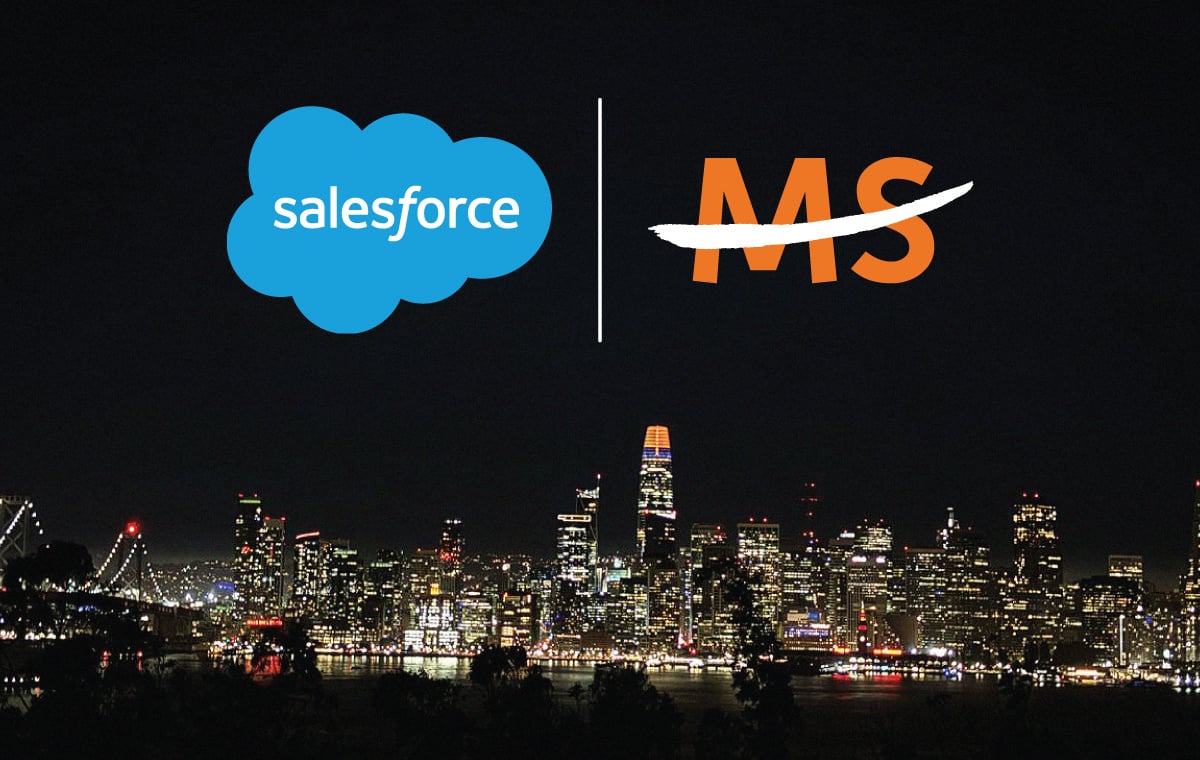This article at a glance:
- Living With Multiple Sclerosis: Matt Nesci, a customer success manager at Salesforce, learned at age 25 that he had multiple sclerosis (MS), a complex disease affecting the central nervous system in unpredictable ways. MS symptoms, ranging from blurred vision to impaired coordination, can be overwhelming and confusing. This is particularly true in the early stages, as Nesci discovered through personal experiences.
- Working for an Accessibility-First Organization: Salesforce has provided Nesci with crucial support, enabling him to manage his condition while maintaining a healthy work-life balance, reducing the stress that often exacerbates MS symptoms.
- Salesforce & National MS Society Partnership: Salesforce's partnership with the National MS Society has fostered a vibrant community and raised more than $4 million through various events. It provides a strong network for employees with disabilities, including those with MS.
- Visibility Event Shines Light on MS & Those Affected: For World MS Day 2024, Salesforce organized an event with the National MS Society, culminating in the illumination of San Francisco’s Salesforce Tower in orange—symbolizing hope and solidarity for the MS community.
Living With Multiple Sclerosis
For many professionals living with disabilities, receiving a formal medical diagnosis is a long, arduous journey that often begins with health symptoms with seemingly inexplicable origins. This uncertainty can provoke anxiety, frustration, and fear.
Plus, it’s not uncommon for health conditions to be misdiagnosed.
That was the case for Matt Nesci, a customer success manager at Salesforce. He was diagnosed at 25 with multiple sclerosis (MS), a condition that manifests in notoriously varied ways depending on the person.
Roughly 1 million Americans and 2.3 million people worldwide have been diagnosed with MS, according to the National MS Society.
MS is a disease that affects the central nervous system, specifically the brain, spinal cord, and nervous system. A hyperactive immune system attacks the protective fatty tissue (myelin) surrounding and insulating nerves, preventing them from properly conducting electrical impulses.
“Because it attacks the brain and the myelin,” Nesci explains, “it affects speech, walking, talking, balance, tiredness, anything that the brain controls, which is everything.”
This damage can lead to inflammation and scarring, which can cause a range of symptoms including blurred vision, impaired coordination, tremors, muscle weakness, dizziness, numbness, memory problems, and other cognitive changes.
Identifying potential MS symptoms is often tough and bewildering during its early stages.
“When you're first diagnosed it's very stressful because you wonder ‘Is this MS?’” he says. “Your feet are falling asleep. Is this MS? So it's a very overwhelming feeling to go through.”
His first MS attack since diagnosis happened on the way home from Dreamforce, Salesforce’s annual global tech conference. His arm wasn’t “functioning properly” and he could tell “something was off” but wasn’t sure why.
“When I came home, I was trying to wipe down the counter and my hand was going in slow motion,” he says. “The strength was fine. I just couldn't control my arm. So long story short, I got an MRI, and it had a huge active lesion that looked like Saturn. When you're having an attack, you can see the activity of the lesions breaking down the myelin. I was in the hospital for a couple of days with steroids and it was a while before the function came back. My arm was bumping into things. Now, it's probably 95 percent. You can't even tell, but everybody's path is different.”
Working for an Accessibility-First Organization
Having a supportive employer makes a world of difference for professionals with disabilities. For those living with MS, it relieves many of the anxieties employees have about whether they’ll be able to continue in their present position when unexpected health challenges appear.
Stress is a major trigger for MS symptoms, but being part of an accessibility-first organization helps limit it and encourage a healthy work-life balance. Nesci is quick to point out that there’s “good stress” and “bad stress," but what a stabilized level of stress feels like varies from person to person because both can affect MS.
MS creates many stressful circumstances for people living with the disease, including diagnostic uncertainty, loss of control because symptoms come and go, the need to constantly adjust and readjust to changing abilities, the possibility of cognitive impairment, and financial hardships.
Work is a major culprit for most professionals with MS.
Before joining Salesforce, he worked as a consultant. He loved interacting with customers every day; however, he knew 60-hour work weeks and long-term stress of the position weren’t in his best interest.
It just wasn’t “sustainable,” Nesci explains.
When he found an opportunity to work for Salesforce, he took it and hoped the position would better accommodate his needs as somebody living with MS. He just didn’t know he would find as much support as he has.
“Salesforce is outstanding from a benefits perspective,” says Nesci. “I didn’t even know about all the things Salesforce was doing with the National MS Society until five years into my time here. The main thing I try to do from a career perspective is to make sure that I’m balancing my stress. It's like you try to stay in this middle zone. Because of that, I just try to have better boundaries, meditate, and do things like that to stay in the zone.”
 Salesforce's Climb to the Top Rochester team participating in an event to raise awareness for MS.
Salesforce's Climb to the Top Rochester team participating in an event to raise awareness for MS.
It’s not just the inclusive work culture that attracts professionals with disabilities to Salesforce. Its commitment to accessibility is also matched by inclusive hiring practices aimed at recruiting professionals with disabilities.
Toli Kuznets is an engineering director at Salesforce. He was shocked and relieved to learn his disability wouldn’t prevent him from being considered when applying for a position.
“Salesforce did not get scared when I announced that I have MS,” he recalls. “When I interviewed for the position I was told that I have MetLife in my back pocket, who would always come in and ‘help out’ if needed. I dismissed it then just as another recruiting pitch.”
The tech titan continued aiding Kuznets while he navigated his MS diagnosis and figured out a treatment plan tailored to his needs.
“When I was diagnosed with PPMS [primary progressive multiple sclerosis] a few years later, Salesforce didn’t disappear,” he continues. “It was definitely an ‘in sickness and in health’ relationship. I was able to go on short- and then long-term disability, as I was learning how I could be treated. Salesforce continued to stand behind me unconditionally."
Salesforce & National MS Society Partnership
Having been with Salesforce for eight years, Nesci has become immersed in the energetic community the cloud-based software company has created for professionals with disabilities.
A business resource group dedicated to employees living with disabilities, Abilityforce not only provides support for people with MS, but shares a strong relationship with the National MS Society, a nonprofit focused on MS research, education, and assistance.
The National MS Society collaborates with 30 corporate teams nationwide engaged in raising awareness around MS. Salesforce has maintained one of these teams since 2005.
The partnership began at a Bike MS event that year and has since raised more than $4 million for the National MS Society.
"When I reflect on our partnership, I always think about a photo of the first Salesforce and Friends team that was taken on a flip phone,” recalls Sheila Casey, who oversees the MS Society’s National Team program. “It’s very grainy.”
She smiles when talking about the team’s growth from a “ragtag group of kids in Birkenstocks after their first MS bike event” 19 years ago to one that participates in “almost all of our peer-to-peer events. Salesforce, along with their partners, customers, friends & family are an important part of the MS Movement.” These include walks, hikes, runs, and climbs rallying support for the MS community.
“These captains are fantastic,” she continues. “They meet monthly to connect, share best practices, and create camaraderie. Seeing people like Matt share his story and others have grown the commitment of all the team captains who might have started a bike team just because there are cyclists. So it is like a family. It’s just a fantastic partnership.”
Visibility Event Shines Light on MS & Those Affected
The coronavirus pandemic was devastating, and particularly exhausting for people living with MS, because the medications taken to manage symptoms end up suppressing their entire immune system, as well.
Nesci first became involved with the MS Society during this time.
“I ended up stumbling across the Climb to the Top event,” he recalls. “Because it was during COVID, it was virtual. We were able to put together a local team and then it's grown over the years. I think last year we had 10 or 12 people. Through that, I realized we have this bigger community here. I also realized some of my coworkers have MS. We’ve formed an internal private group where we meet monthly to just talk about anything.”
For World MS Day on May 30, Abilityforce wanted to “do something big,” he remembers.
In tandem with the MS Society, they hosted an event with several Salesforce employees sharing their experiences with MS and how it affects their professional lives. They told their diagnosis stories guided by the mantra, “My MS is my MS,” highlighting the unique ways MS manifests for each person.
This culminated with Salesforce Tower—the tallest building in San Francisco—being lit orange, a color deeply connected to the MS community. Nesci becomes emotional thinking about the impression this left, particularly on a family who happened to walk by when orange light bathed the 1,070-foot building.
“They were so moved by it that they went out and took a picture,” he says. “I'm tearing up just talking about it. They took a picture of the tower and I'm like, ‘My God.’ You don't think it would have an impact like that.”
 Moved by the lighting of Salesforce Tower in orange for MS World Day, this family took a picture and shared it with Matt Nesci.
Moved by the lighting of Salesforce Tower in orange for MS World Day, this family took a picture and shared it with Matt Nesci.
The lighting event left a palpable impact on the local community and has helped grow the private MS group’s numbers at Salesforce, as well, Nesci says.
“We want to bring awareness to Salesforce and how much it meant to be able to light up the tower and to get that accomplished and how much it meant for the people of San Francisco who are living with MS,” he explains. “I received great feedback from people who know me that attended—but the other thing that came out of the event is we've gotten three new members into our private group.”
Nesci notes it’s a dramatic increase in participation numbers.
Interacting with people new to the group has been “very inspiring” for Nesci and his peers. He believes hearing stories of how other people cope with MS helps them “come together as a community to support each other.”
Ultimately, it’s this ongoing support and spirit of inclusion that will motivate other Salesforce teams and tech companies to become more accessibility-first when hiring employees and developing effective company cultures.
Salesforce is a founding partner of InclusionHub, a resource for digital accessibility dedicated to helping businesses prioritize digital inclusion. You can learn more about accessibility and inclusion in the workplace by visiting Salesforce’s a11y website.





Leave a Comment